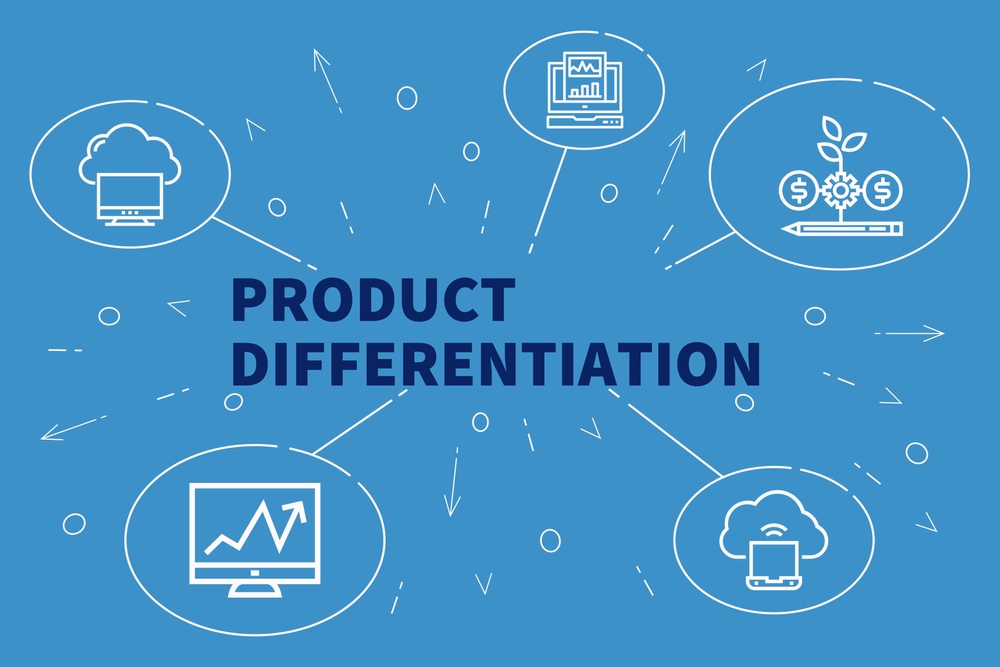The Startups Team

What Is product differentiation?
Product differentiation is process used by companies to clarify the differences between their products and other products on the market. Those other products can include competitors but also a company’s own products, to prevent overlap between the offerings. The goal is to find a product’s unique selling point (USP).
Why is product differentiation important?
Product differentiation is important because it makes your product stand out from the crowd! It’s easier and easier to create a company or sell a product or connect directly with factories in China these days. So what makes your housewares product or dating app or SaaS product different from all of the other housewares products, dating apps, and SaaS products out there? Why should the user go with your version, instead of one of the others?
If you can’t answer those questions satisfactorily, then you can’t market product. If you can’t market your product, you can’t sell your product. And if you can’t sell your product, your startup will fail.
That’s why product differentiation is important.
How does product differentiation work?
Types of product differentiation
There are two main types of product differentiation: horizontal and vertical. Let’s take a look at both.
Horizontal
Horizontal product differentiation is any differentiation that’s not about your price point or even your quality. Usually in the real world that means a personal or brand preference on the part of the consumer.
Think Tinder versus Bumble or Walmart versus Target. In both cases, the price points and qualities of the products are about the same. The consumer’s choice, then, is as much about the image they want to project of theirself as it is about the product itself.
Vertical
Vertical product differentiation is when similar products have vastly different quality and price points. For example, think of a black handbag. Vertical differentiation can be seen in a black handbag purchased from fast fashion retailer H&M, compared with one from mass luxury brand Coach, compared with one from the extremely high end luxury brand Berkin.
All three are black handbags, but the materials, craftsmanship, stitching, price point, and perceived value of each is vastly different from the others
Product differentiation factors
Within those two broad types of product differentiation, there are more granular ways to distinguish between products. These are the product differentiation factors you should be considering.
1. Price
Price is a fairly obvious product differentiation factor, right? It’s one you’re probably already very aware of. And it can be a major product differentiation factor,
Some questions to ask:
How does your pricing compare to that of your competitors?
Does having a lower price give you a competitive advantage — or does it make your product seem “cheap” in quality?
Does having a higher price make your product competitive by positioning it as an aspirational or luxury item? Or will a higher price drive customers away?
2. Performance and reliability
In these days of planned obsolescence, great performance and long time reliability can really set your product apart from the competition. If you’ve built a company that focus on those values — or that is very consciously meeting a gap in the market when it comes to performance or reliability — this is the factor you should be thinking about.
Some questions to ask:
Does your product last longer than the competitor’s?
Do you have concrete examples you can point a user to?
3. Location
For brick and mortar companies, location can be a major factor for product differentiation. A lot of people want to support local businesses, so if your company fits that bill, make it clear!
Some questions to ask:
What is about my location that benefits my end consumer?
Am I in a location where people care about supporting local business?
What does being local mean to me? To my company?
4. Service
Service is one product differentiation factor that applies to a wide range of companies. Tech startups in particular often choose to emphasize their great service when compared with both big name competitors and other tech startups.
Some questions to ask:
What kind of service can users expect from my staff?
What specifically makes my service team great?
How are my competitors failing when it comes to service?
5. Design
While some products can get away with boring or poor design, that’s becoming increasingly difficult in this age of higher competition. So whether you’re developing your product or you’ve already developed something and want to figure out how it stands out, take your design into consideration.
Some questions to ask:
Is your product providing a similar service but with a very different design?
What about your design stands out from what your competitors offer?
How’s the design of your website? Is it really easy to navigate? Is it doing something totally new?
Customization
One way that a product can differ from the competition is through customization. If all of the current couch companies are selling just three models of couches, for example, maybe your couch company can offer custom couches down to the smallest details.
Some questions to ask:
Could your customers benefit from customization?
Which services, exactly, can you offer them?
Why is your product one that needs to be/should be customized?
How to develop a product differentiation strategy
1. Do your market research.
The first thing you need to do when developing a product differentiation strategy is market research. After all, how could you possibly determine the ways your company differs from others out there unless you know what’s out there already?
If just the thought of this first step has you scratching your head, check out the Startups.com guide, “How To Do Market Research.”
2. Brainstorm with your team.
Some people (mistakenly) believe that determining a product differentiation strategy is the job of the marketing team and the marketing team alone. In reality, your entire team — from engineers to sales people to the C suite — should be involved in helping work out market differentiation. That’s because the factors that differentiate your company or product (which we outlined in the previous section) can come from pretty much any part of the company. So why would you have only marketin ginvolved?
3. Pick your factors!
And, finally, pick your product differentiation factors! Decide what you’re going to focus on, and make them integral parts of your product roadmap.
Ultimately, following a product differentiation process can make not only your marketing but your whole company stronger, as you clarify exactly what it is you do and offer. So what are you waiting for?
Find this article helpful?
This is just a small sample! Register to unlock our in-depth courses, hundreds of video courses, and a library of playbooks and articles to grow your startup fast. Let us Let us show you!
Submission confirms agreement to our Terms of Service and Privacy Policy.
Already a member? Login
No comments yet.
Start a Membership to join the discussion.
Already a member? Login
